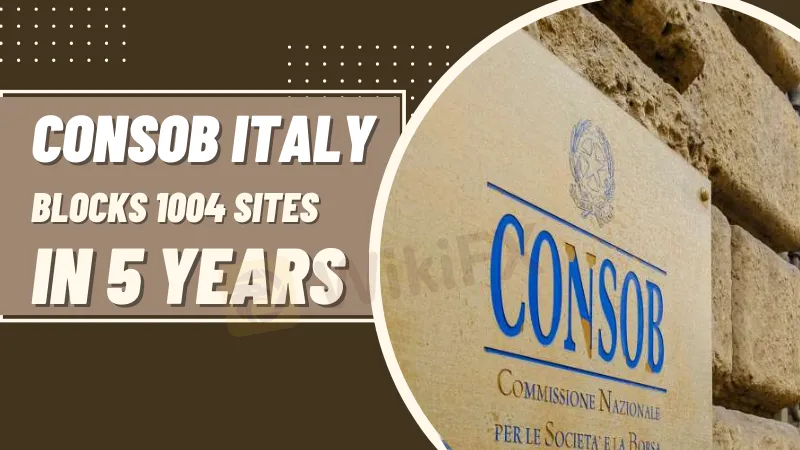CONSOB Italy Blocks 1004 Sites in 5 Years
Abstract:Discover how Italy's CONSOB blocked over 1000 financial websites in 5 years to protect investors, including action against eToro and a focus on crypto regulation.

In the realm of financial oversight, Italys CONSOB has been a vigilant watchdog. In a significant move, they have taken action against a large number of investment websites, totaling more than a thousand in the past five years. These are not just random websites; they are platforms offering financial and investment services, many holding licenses from countries other than Italy.
This initiative is not a random crackdown; it's a carefully strategized effort to shield Italian investors from the dangers of fraudulent or unapproved investment schemes. Italy's proactive approach in this arena is noteworthy. It has become an exemplar for other countries facing similar challenges in regulating the complex and often borderless world of digital assets and online trading platforms.
The most recent addition to CONSOB's list includes four new domains. These sites have been red-flagged for promoting trading products illegally within Italy. The message from CONSOB to Italian investors is loud and clear: avoid engaging with financial services from these blacklisted companies. The recent culprits include “Blackridge Capital Management Ltd,” “Alphascrypto,” and “Fast-MNG.”

This robust action has been made possible through the ‘Decreto Crescita’ law, empowering CONSOB to effectively restrict Italian investors' access to certain online brokers. Over the years, this law has been a cornerstone in their strategy, leading to nearly 1004 domains being blocked for safeguarding the financial interests of Italian citizens.
While the law enables Consob to direct Italian internet service providers (ISPs) to block access to these unauthorized websites, the process is not instantaneous. Technical limitations can lead to a delay of several days before the websites are completely inaccessible. Moreover, some websites may temporarily shut down, further complicating the blackout process.
Among the blacklisted sites, many offer trading opportunities in forex and Contracts for Difference (CFDs). However, a particular concern for CONSOB has been those sites dealing with crypto assets. This includes trading in underlying cryptocurrencies as well as related derivatives like CFDs. This move by CONSOB underscores its awareness and caution regarding the potential risks and regulatory complexities associated with crypto trading. Their intent is clear: to ensure these platforms comply with the stringent financial regulations of Italy.
In a related development, eToro, an Israeli multi-asset brokerage firm, was recently fined €1.3 million by Italys antitrust authority, AGCM. The penalty was imposed for misleading consumers about the actual costs associated with its stock trading services. While eToro promoted its platform as offering zero-fee stock trading, AGCM found that the company failed to provide adequate information about other associated costs, such as exchange rates and limitations on transferring portfolios to other brokerage firms.
About CONSOB

CONSOB, short for Commissione Nazionale per le Società e la Borsa, is the primary authority responsible for regulating the Italian financial markets. Their role is multifaceted, encompassing the supervision of market operators, ensuring transparency and fairness, and protecting the interests of investors. They monitor the activities of financial entities, scrutinize their operations, and enforce regulations to maintain the integrity of the financial market. As a regulatory body, CONSOB plays a crucial role in establishing a secure and trustworthy financial environment, promoting investor confidence and stability in the Italian financial ecosystem.
Interested in discovering brokers under CONSOB's watchful eye? Dive into the world of secure and regulated trading by visiting the WikiFX brokers page specifically tailored to CONSOB-regulated entities. Find your ideal broker today!
Link: https://www.wikifx.com/en/search.html

Read more

Oil Prices Fluctuate as Iran and Trump Clash!
As Trump once again implements the "maximum pressure" policy on Iran, oil prices have become increasingly volatile, and the atmosphere in the international markets has grown more tense.

Best Regulated Forex Brokers Offering Daily Trading Signals
Discover the best-regulated forex brokers offering daily trading signals. Compare features, pros, cons, and key considerations for informed trading decisions.

U.S. Court Orders Randall Crater Fined $7.6M for My Big Coin Fraud Scheme
Randall Crater was fined $7.6M for My Big Coin fraud, banned from trading, and sentenced to prison in a landmark CFTC enforcement action.

KCM Trade Launches AI Mentor to Boost Trading Insights
KCM Trade introduces AI Mentor, an AI-powered tool offering personalized trading insights, performance analysis, and real-time news to enhance your trading journey.
WikiFX Broker
Latest News
EBSWARE Prop Launches Forex Trading Tournaments for Brokers
Key Risks and Downsides of Forex Trading Explained
How a Crypto Scam Cost Company Manager RM2.56 Million
TD Bank to Sell $14.9 Billion Schwab Stake, Repurchase Shares
Warning Against Agra Markets: Stay Cautious!
Scam Exposed: GlobTFX Deceives Another Investor
Trump tariffs: Retaliate or negotiate - what will US partners do next?
Hacker Who Breached SEC Account and Falsely Announced Bitcoin ETF Approval Faces Trial
Oil Prices Fluctuate as Iran and Trump Clash!
Best Regulated Forex Brokers Offering Daily Trading Signals
Rate Calc

